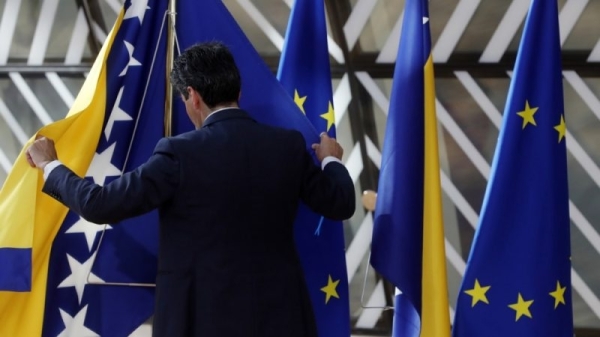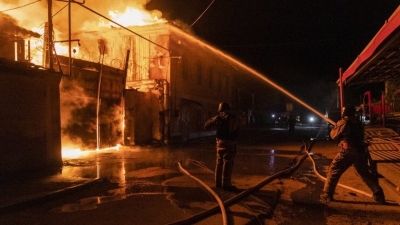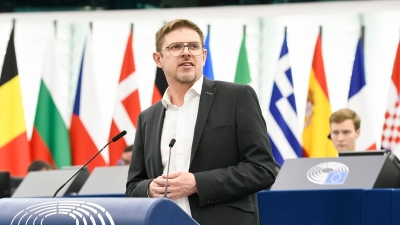EU mulls how to proceed on Ukraine, Moldova, Bosnia and Herzegovina

As EU leaders face a tough call this week whether to move with the next steps for Ukraine and Moldova or risk a delay until after the EU elections, progress on Bosnia and Herzegovina is expected to complicate matters further.
When EU leaders meet in Brussels on Thursday (21 March), the European Commission is expected to deliver a written report on Bosnia and Herzegovina and give oral assessments on Ukraine and Moldova.
They were initially not expected to go into detail and only take stock of progress made by that point, according to early draft summit conclusions seen by Euractiv, but it seems a longer discussion will now be needed.
Ukraine and Moldova
After EU leaders made the historic decision to open EU accession talks with Ukraine and Moldova, the next technical steps experienced a slight delay.
Three months into the year, the European Commission presented the negotiating frameworks, roughly 20-page documents and the 35 negotiating chapters that need to be approved by member states before formal talks can start.
The documents follow the same model as those negotiated by Albania and North Macedonia and are more of a technical overview rather than including controversial political elements.
Both countries also hoped that an intergovernmental conference (IGC), marking the official opening of talks with both countries, could be held in March.
However, both decisions require unanimity, which EU diplomats think will be difficult to achieve between EU leaders on Thursday.

Ukraine’s EU accession will have more benefit than cost, says PM Shmyhal
Ukraine’s future accession to the bloc will bring more benefits than costs, and EU member states should approve the next formal steps later this week, the country’s Prime Minister Denys Shmyhal told Euractiv.
“We are waiting and wishing to have approval …
Nearly half of the EU’s member states support a swift adoption of the documents, ideally by this week’s EU summit, holding an IGC under the Belgian EU Council presidency, which ends in July, according to internal meeting notes seen by Euractiv.
“There is a bit of a reluctance to let this rest too long and risk not moving at all in June as we risk that nothing moves under the Hungarian EU presidency in the second part of this year,” one EU diplomat said.
The other camp would prefer to move the decision towards June, after the European elections, when there is also more clarity about the bloc’s new institutional set-up.
Sticking point Bosnia
The question will be how the European Commission’s recommendation to open negotiations with Bosnia and Herzegovina will go down with European leaders this week.
“There is still some uncertainty in the room, and that part of the text is still under brackets,” a second EU diplomat said.
The country is one step behind Ukraine and Moldova, as the opening of EU accession talks is conditional on the country completing a number of reforms.
The European Commission last week recommended that Bosnia and Herzegovina start accession talks, with Commission President Ursula von der Leyen saying the country had made “impressive steps.”
To long-term observers, however, the step was a surprise since the country’s recent EU enlargement report noted limited progress, particularly on electoral reforms.
Over the past week, several EU diplomats and officials have expressed concern over the bloc diverging from its ‘merit-based’-approach to enlargement.
“The European Commission has taken a very political approach to the report,” a senior EU official said.
“If it would have been honest and said that the criteria are not reached, but we should move ahead because of necessity it would be less problematic than telling us that all is rosy and has improved,” the official said.
“That’s not quite true and complicates things in some Western European countries’,” they added.
While half of the EU member states support the step, several countries, including France, the Netherlands and Denmark, have expressed reservations about the level of compliance reached by Sarajevo.

EU warns Bosnia’s Republika Srpska over defiance
The EU warned the authorities of the increasingly defiant Republika Srpska (RS), the Serb entity of Bosnia and Herzegovina, on Wednesday (20 July) to cease divisive rhetoric and actions or face “serious consequences”.
“Should EU leaders greenlight this, we will need to talk about what takes precedence, a merit-based process or geopolitical necessities,” a third EU diplomat said.
“Either way, we need to be honest about what standards we apply, which maybe should include a rethink of how we go about the process itself,” they said.
For some EU member states, including Austria, Croatia, Hungary, and Slovenia, accession progress on Ukraine and Moldova would need to go hand-in-hand with progress for the Western Balkan countries.
Over the past weeks, they have lobbied that the next steps for Ukraine and Moldova be tied to Bosnia and Herzegovina’s.
The majority of EU member states, however, have been pushing for equal treatment of all three countries.
“What we’re worried about is that suddenly we start tying countries together again, which is a mistake we’ve made in the past that has risked discrediting the whole process,” a fourth EU diplomat said, referring to the Bulgarian veto over North Macedonia which held up Albania’s progress.
What about reforms?
EU leaders are expected to stress on Thursday that both – enlargement and the bloc’s reform – should go hand in hand, a line that has been since their informal summit in Granada last October.
The European Commission was expected to publish a communication on pre-enlargement reforms and instruments last month but has repeatedly delayed its presentation.
European affairs ministers were initially slated to discuss the document on Tuesday (19 March), but the EU’s executive decided to table the document on Wednesday.
Belgium is expected to organise further discussions on governance reforms, the budget and internal work within the Council towards the June EU summit.
That is also when EU leaders are expected to sign off on the so-called “Strategic Agenda” document, which is expected to give guidance to the new European Commission on the priorities for the years ahead.
“We have to be realistic, this outgoing European Commission should not be the one to decide on to deal with the enlargement reform agenda – it would be ingenuine,” a fifth EU diplomat said.
“EU leaders will give direction in June, but let’s first see how Europe looks like after the elections and after summer,” they added.
Read more with Euractiv




